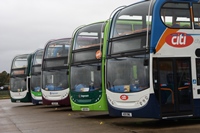
Profit margins outside London down to 7.2%, from 8.8%
Profits in the UK bus industry fell in 2012/13 for the third year in succession, according to new analysis published this week by Preston-based transport specialists The TAS Partnership.
The 132-page report Bus Industry Performance 2014 presents the results of its annual analysis of 127 local bus companies around the UK, in what is the 23rd year of the firm’s Bus Industry Monitor project
The report says that operators have managed to increase revenue by more than inflation, but that the growth was outstripped by increases in operating costs.
Turnover across the companies analysed increased by 4.1%, reaching £5.44 billion. Operating costs rose by 4.7% to £5.1 billion. Operating profit was £336.9m, 4.2% lower than in 2011/12. Operating margins fell to 6.2% (2011/12: 6.7%). Margins varied across the country: they stood at 8.3% in urban (PTE) areas and in Wales, 6.7% in the English Shires and 6.2% in Scotland.
Outside London, revenue grew by 3.9% but operating costs rose by 5.7%. As a result, operating profit margins in the deregulated market fell to 7.2% from the 8.8% recorded in 2011/12. In the capital, profits recovered from a record low of 2.6% in 2011/12 to 4.1%.
At the same time, the report calculates the levels of profits which operators need in order to meet their financial obligations and invest for the future. TAS estimates that required margins are between 10.5% and 11% ? well above the levels currently being earned.
Commenting on the report, author Chris Cheek said, “Our analysis shows that any suggestions of excess profits are seriously misleading. It is also false to compare margins with the much lower figures earned in London, since these are based on a completely different business model, which employs much lower levels of capital. This is because most buses are rented for the duration of a contract under an operating lease.”


